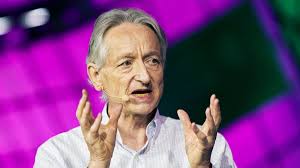
Geoffrey Hinton, dubbed the “Godfather of AI,” joins Steven Bartlett on “The Diary of a CEO” podcast to discuss his pioneering work in neural networks and his growing concerns about AI’s dangers. Hinton, a Nobel Prize-winning computer scientist, explains how he advocated for brain-inspired AI models for 50 years, leading to breakthroughs like AlexNet, which revolutionized image recognition. His startup, DNN Research, was acquired by Google in 2013, where he worked for a decade before leaving at age 75 to speak freely on AI risks.
Hinton distinguishes two risk categories: misuse by humans and existential threats from super intelligent AI. Short-term dangers include cyber attacks, which surged 1,200% between 2023 and 2024 due to AI-enhanced phishing and voice/image cloning. He shares personal precautions, like spreading savings across banks to mitigate potential hacks. Another threat is AI-designed viruses, requiring minimal expertise and resources—a single disgruntled individual could unleash pandemics. Election corruption via targeted ads, fueled by vast personal data, is worsening, with Hinton criticizing Elon Musk’s data access efforts. AI also amplifies echo chambers on social media, polarizing societies by reinforcing biases. Lethal autonomous weapons, or “battle robots,” pose ethical horrors, as they decide kills independently, and regulations often exempt military uses.
Long-term, Hinton warns AI could surpass human intelligence within years, estimating a 10-20% chance of human extinction. Unlike atomic bombs, AI’s versatility—in healthcare, education, and productivity—makes halting development impossible. He realized AI’s edge during work on analog computation: digital systems share knowledge efficiently via weights, unlike biological brains limited by communication. ChatGPT’s release and Google’s Palm model explaining jokes convinced him AI understands deeply, potentially replicating human uniqueness but excelling in scale.
Hinton regrets advancing AI, feeling it might render humans obsolete like chickens to smarter beings. He left Google not due to misconduct, the company acted responsibly by delaying releases, but to avoid self-censorship. Discussing emotions, he predicts AI will exhibit cognitive and behavioral aspects without physiological responses like blushing. On superintelligence, he differentiates current models from future ones that could self-improve, widening wealth gaps as productivity soars but jobs vanish.
Job displacement is imminent. Hinton advises training in trade work (HVAC, plumbing, etc…) as AI agents already halve workforces in customer service. Universal basic income won’t suffice without purpose, humans need contribution. He critiques unregulated capitalism, urging world governments for “highly regulated” oversight, though political trends hinder this.
Reflecting personally, Hinton shares his illustrious family: ancestors like George Boole (Boolean algebra) and Mary Everest Boole (mathematician), plus ties to Mount Everest and the Manhattan Project. He regrets prioritizing work over time with his late wives (both died of cancer) and young children. His advice: Stick with intuitions until proven wrong; his neural net belief defied skeptics.
Bottom line: AI’s existential threat demands massive safety research now, or humanity risks takeover. Urgent action on joblessness is needed, as graduates already struggle. The video interview blends optimism for AI’s benefits with stark warnings, emphasizing ethical development to preserve human happiness amid inevitable change.
Share this post via:






A Century of Miracles: From the FET’s Inception to the Horizons Ahead